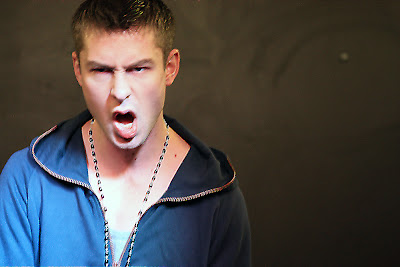Written for Culture Wars

“Micky Mouse Britain,” as Tash Fairbanks and Toby Wharton present it in Fog, contains a Welfare State Mowgli.
Gary – or Fog, as he’s nicknamed, meaning ‘Fuck Off Gary’ – has just left a care home to move in with his newly-returned father, a soldier. He comes across as a mongrel; a lost boy playing adult in the only way he knows how. At home, he throws tantrums and loses days to his Game Boy. Alone and amongst peers, he puffs his chest, slashes a knife around and hypes himself as a gangster in the making.
His tragedy is never to have stood a chance and, in laying ultimate blame with absent dad Cannon (Victor Gardener), Fog is a play with its roots to the right. Its society is rudderless; expectant of reward rather than willing to earn it. Meaning has been lost, such that estate blocks are named after Romantic poets and rosaries are empty fashion symbols.
As such, Gary does not know how to be a man. He has none of his father’s practicality: while Cannon fits up the flat, Gary plonks himself in front of MTV Cribs. He imitates his father’s actions and reactions, echoing them awkwardly a split second late. The craving for an adult male role model is obvious. The welfare state steps in inadequately where families have failed to do so. All Gary has had previously are his care home elders, some of whom, we’re told, once locked him in a cupboard and broke his arm.
The mixture is one of timidity and savagery, and Gary has shades of a wolf-cub: alpha and aggressive amongst peers, but meekly cowering in the presence of elders. He’s unsteady in society, completely vulnerable, yet believes himself a ‘big man’. It’s a disturbing concoction with shades of Edward Bond’s Saved, played with extraordinary nuance by Wharton himself. He flicks between mewls and snarls in the snap of a switchblade knife.
Where Fog falters, however, is in its attempts to embed Gary and Cannon into a wider, real-world situation. The father-son relationship works best well when semi-detached; when it’s just the two of them alone in their flat, negotiating one another after years apart. By bringing in a reformed junkie sister and a university-bound best mate, Michael (Benjamin Crawley, with a delicate touch), Fairbanks and Wharton slip into unnecessary cliché. While these relationships allow Gary’s other side and past to emerge, they puncture the disconcerting intensity and warped isolation of the central relationship. Like Andrew Sheridan’s Winterlong, Fog presents a twisted, harsh bubble in a world that is just recognisable as our own. By stressing the latter point it dilutes the former.
Che Walker’s production – in particular Georgia Lowe’s design – follows suit, deflating as it grows increasingly naturalistic. At first, a right angle of concrete slabs with an upturned rusting tricycle serves as the flat with perfect sparseness. It stands in, but speaks volumes. Michael and his sister Bernice’s living-room, with its sofa, ironing board and framed photograph, is bland by contrast.
Nonetheless, Walker characteristically draws some fine, animal performances from his cast. He’s particularly good at finding characters’ own blind spots; the traits that they are not themselves aware of. Kanga Tainkye-Buah is brilliantly snags the flaunting vanity of Bernice, while Crawley catches the shrug-shouldered softness that her brother would never admit. Gardener is raw and brutish as Cannon, but finds the underlying cowardice that stops him from taking real control of his son.
Photograph: Finborough Theatre
0 comments:
Post a Comment